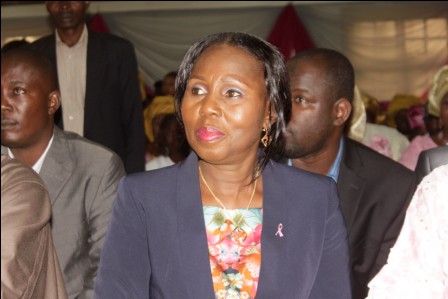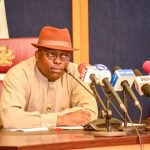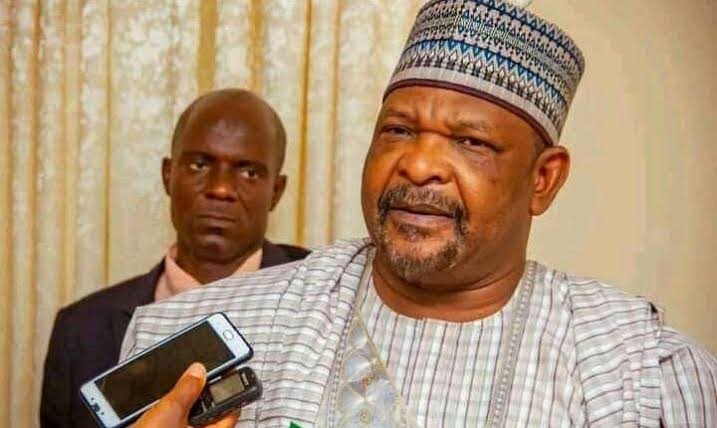Breasts Are No Big Deal, Yank Them Off If They’re Cancerous — Ondo First Lady Akeredolu


Mrs. Betty Anyanwu-Akeredolu is the wife of Ondo State Governor, Oluwarotimi Akeredolu (SAN). She is also the founder of Breast Cancer Association of Nigeria (BRECAN). She spoke with reporters in Akure on her advocacy programme on breast cancer treatment and other salient issues. DAMISI OJO was there.
What actually informed the birth of BRECAN and how far you have gone on its advocacy?
I am a breast cancer survivor of 20 years now and still counting. It all started in 1997 when I was diagnosed with it.
I never knew anyone who had that experience except the little information I got from Cable TV then, Midlands, CNN, Skynews. It was not something we were familiar with. Very little was reported in the media. On that fateful morning when I felt something in my breast, of course, my mind raced to breast cancer because I knew where such disease was located. I was scared, not knowing what to do. It happened while I was resting at home during my annual leave. I was thinking that if this happened to be breast cancer, what was I going to do at that age? I was 42 or 43 years and I had little children. What would become of my children? I kept it to myself for almost one week as I didn’t know what to do. My baby was just four or thereabout. So, I just tuned to television that morning and heard that “this programme could save your life”.
Immediately I heard that, I just raised myself from the pillow and now sat and was wondering what could this be? And it happened to be about breast cancer survivors’ journey. That kind of coincidence, I don’t know. It was what was meant to be, and it really saved my life. There was this white woman on the Rolando Show, and it was her journey through breast cancer diagnosis, and she happened to be the mother of popular Hollywood actors, the Baldwin Brothers. They are very popular in Hollywood. She went through the treatment and then she could call herself a survivor and was sharing her experience for the whole world to listen. She used the chronicle of her journey to lift the spirits of those that were undergoing such experience, and I benefitted from it. How? After listening to the programme, I quickly summoned courage to go to the hospital.
I said whatever this woman did, I would be like her. It was after the examination by the doctor, who again confirmed that there was a lump. But even at that stage, he didn’t know what it was. I want to quickly emphasise something at this juncture: it is part of the awareness campaign. When women notice a lump, they don’t know what that lump is until you see a doctor and he would recommend a test. It is after that test you now know whether what you have is a cancerous lump or a benign lump. We got to know that there are two types of lump: the benign one, which is not cancerous, and the cancerous one. But you never can tell the cancerous one until a test is conducted. It is very important. When I told my husband, he was scared, but he didn’t know that I had been fortified by that television I watched, and that was it. I think he must have wondered where I gathered the strength from because I was on my feet and already prepared that whatever that woman did, I was going to do and get well.
From then, my treatment commenced. The next thing, what is the next line of treatment? That would be a mastectomy. By then, breast health care was at the rudimentary level in 1997. So, it was still the same radical mastectomy; total removal of the breast. I said remove the damn thing if that is what will make me live, and we did that. The rest is history. What message does your courage to survive the disease portend? Like I always tell women, surviving breast cancer is all about attitude. Losing a breast, it can be very difficult for some women. Immediately they are told they are going to lose their breasts, they are already gone. They are consumed with the thought that their husband would marry another woman who has two breasts.
The thought of losing your husband should not be on the radar. They should be more concerned about surviving for the sake of their children. They must do everything to live and take care of the children because they could not tell the character of the woman that would be married to take care of their children after their death. So when women reject mastectomy and run to a pastor who will be giving them holy water or Jerusalem oil to rub because they don’t want to lose their breasts, and at the end of the day, they come back with decayed breast, which one will anyone choose? Is it not better you lose your breasts, life and be well for your children and husband than you are pre-occupied that your husband will leave you and marry someone else? You have to live before you talk about enjoying marriage. One comes before the other. Being one-breasted does not really define you. Like I told a woman when your husband saw you, he never saw your nakedness.
Even after mastectomy, you can still have a baby. You can breastfeed with one breast. But you must be alive to do this. So, I had successful treatment and everything done by UCH. I didn’t go anywhere. That also brings us to the point that the country doesn’t know what they have because we have everything to make this country great. I think those that are taking the decisions are the ones that are not thinking highly of what this nation can be. When I had my surgery, there was petrol scarcity. We bought fuel in a jerry-can and went to my consultant to give him to use because I needed to get rid of this thing. I was lucky mine was found at stage one. It took me one week and I went to the hospital.
There were some other women because it was not painful, they just carried on, not knowing that they had a bomb in them waiting for the explosion. Unfortunately, over 80 percent of late stages of breast cancer is what we see in the hospital nationwide. Awareness during pink October is not enough. There is a need for structured and sustained awareness for our women to understand the behaviour of this disease. If you don’t explain to them, they will keep thinking it is juju and spiritual attack. It is when you have a robust awareness campaign and consistency too, like what was done to HIV/AIDS. I think we should bring breast cancer to that level and keep talking about it. A woman must be familiar with her breasts. If they are not familiar with how their breasts look like or feel like, there is no way they can notice any unusual change. When you tell our women to do this, they will tell you God forbid or they are covered by the blood of Jesus, they are daughters of Zion. We must figure how we explain it to our women, especially those who are not highly literate. We should bring it down to our people.
We need to bring it down to our people so that they don’t have to waste their time at praying mountains. Science is science. We can still break it down to the language they understand. In China today, everything is expressed in Chinese; the same thing with most of these Asian countries. They have advanced in everything, technology and so on, within the context of their culture, including language. The science that is being taught in the English Language, they brought it down to their local languages. Nobody should think that breaking down science in our local languages is difficult. It is a matter of political will so that people will understand what is going on and take advantage of knowledge. That is why people like us who survived and are still living normal, productive life, there is need to put our faces on breast cancer so that people know that they can survive it. It is not a death sentence.
I don’t think anyone should die of breast cancer these days. When we started, nobody even wanted to be part of BRECAN. Because on getting to UCH and seeing that there were other women also getting treatment for the various stages of the disease, I was obviously disturbed. And when I discussed with my consultant that I was not going to keep quiet, he was surprised because of the boldness in disclosing one’s disease status is what one associates within the western world and definitely not a Nigerian thing. I never knew that people could go there, get treatment and keep their mouth shut without letting anyone know. I wouldn’t do that, and that was how the idea to start an NGO barely six months after I was discharged from the hospital came to me. When the idea came so that other women too can benefit from my experience; that they don’t have to delay before going to the hospital; that if they delay it would be bad for them. It was like a mission. But I couldn’t recruit anyone among the women with me in that ward. Not even one. How did you source the funds to sustain BRECAN? I reached out to my friends. They were good women. Nothing was wrong with them, but they felt they should identify with a friend. They didn’t join BRECAN because they wanted to save the world, but just to support a friend because they saw the passion in me. It sparked something in me.
I didn’t know I had that capacity. I heard people say because they heard me speak on television and on the radio, they mustered the courage to go to the hospital. Now we have eight BRECAN chapters across the nation. The mother chapter is in Oyo State. When my friends followed me, gradually we began the awareness. The problem was money. Nigerians were not giving. We wrote letters to all the banks in this world, all companies, name them, but not even a response. Even the international communities here, their focus was on malaria, AIDS. It is only now that cancer is gaining attention because we are persistent. Sometimes we use strong words against the government. When their wives have it, they are flown overseas for treatment. When it comes to assistance, this is where I have problems with Nigerians. Our people don’t give to charity.
I keep saying it, but when you are in trouble when cancer knocks at your door, you start running, looking for help. Have you donated even N100 to charity? Many of them don’t. That is the problem. We have to begin to be our brother’s and sister’s keeper because we never can tell who this disease will affect. We will be 20 years old this year October. I want to be disappointed that Nigerians will drop us something. Even the fliers we print, some cost N50, some N100. Imagine everybody just doing that, but they find it difficult. I think we need to change our mindset. It can be done, but Nigerians themselves should start to donate to causes like this. Let us start with ourselves. How about you, every average Nigerian on the street? What is your contribution to this cause? This disease affects everyone. The change begins with you. In all the developed countries, it is from their everyday citizens that NGOs get their support. It is not that they are getting subventions from anywhere. It could be $5, $10. That culture is what we lack here. We don’t treat breast cancer.
We are grassroots advocacy group for everybody concerned about breast cancer. We refer people to doctors that treat breast cancer. Not all doctors treat cancer. When people come to us, we make sure they go to the right person where they can access care. We have doctors who we are partnering with; some in UCH, OAU, LUTH, Abuja and FMC Owo. We have radiotherapy machines in this country, but they are not working. Radiotherapy is a crucial part of cancer treatment protocol that every patient must undergo. Sometimes, only one works at a given time, and all patients are referred there. And even that packs up because of overload. Patients begin to hunt for another location. What a shame. Look at India, they are raking in serious foreign currencies from Nigerians because we fail to put our house in order. Policy makers fail to give cancer attention, forgetting it is one of the diseases you meet along the way as you age. And many Nigerians are aging.
Any government that neglects cancer cares little about its citizens. To add insult to injury, cancer is not covered under NHIS. I can’t believe it. We are going to lobby for the policy to be reviewed. Is there any day we don’t hear about people dying of cancer? Our people are dying like flies, especially women. Treating cancer is very expensive. Now, my husband doesn’t need any lobby again, he is an indirect survivor. So, he has to do whatever is within his power to make sure we have a cancer treatment centre. That will at least take off the load on Federal Government. It is overwhelming. They can’t deal with it. Therefore, states that care for their people should have their cancer treatment centres; comprehensive ones. We can then reach out, partnering with the Primary Health Care (PHC) centres so that every woman can visit the nearest health centre for test and examination. Not all doctors can treat breast cancer. It is specialized medicine. Our women are being mismanaged. Most of the doctors around are not cancer specialists.
The experts are few and can be found in teaching hospitals and Federal Medical Centres. Even in some state hospitals, they don’t have experts. For the proposed cancer treatment centre, we are hoping that the governor will appropriate fund to establish it for us soon. As the incumbent first lady in Ondo State, how will people benefit from the state government in breast cancer prevention? We are so sure that this government will demonstrate to us that it is truly a progressive one. One good thing is that all roads will lead to Ondo State for this advocacy. Aside from people coming here to get treatment, it will also serve as medical tourism for the state. People will come here and spend their money and internally generated revenue (IGR) will shoot up with several socio-economic advantages attached to it.
We have established BRECAN club in Queen’s School, Enugu, which has a population of 4,000 girls. When our women failed to listen, they are still presenting breast cancer at terrible stages, though we knew that human behaviour is very difficult to change because we are also bedevilled with our culture and religious convictions that are a bit difficult to change overnight. We decided to beam our searchlight on their daughters in secondary school. They are not yet fixated on their beliefs. Their readiness to become advocates is exciting! By establishing these chapters, we are raising armies of foot soldiers who will comb all the nooks and crannies of this country. If we continue this way, every woman will be aware, then we will press the government to do the needful, which is budgeting money to improve the infrastructure for breast health care.
Source: The Nation










